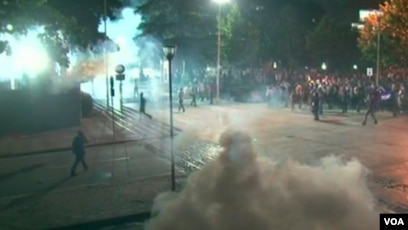Janusz Bugajski: ALBANIA ON BRINK OF DISASTER

Albania must avoid sliding into conflict and chaos, as the repercussions could be more damaging than the state collapse witnessed over twenty years ago. Political radicalism, violent protests, social unrest, and institutional instability will not only drag the country intodomestic crisis but it mayalso generate regional instability, block Albania’s path toward EU integration, and weaken its relations with the United States.
Compared to the economic crashin 1997, Albania’s current “pyramid schemes” are both political and economic. Clientelism and corruption have deeply infected both major parties while there is no viable third alternative. But even worse than official corruption is the extreme polarization of Albania’s politics.All countries in the Balkan region are undermined by profitable links between politics and business, but none of them have experienced Albania’s acute bipolar disorders.
Kosova has a viable multi-party system, with at least four major formations competing for office. Even though Montenegro’s politics is divided between Montenegrin and Serbian streams, the pro-independence parties are stronger and have remained in office over several election cycles. North Macedonia may have two major parties but because of the important role played by Albanian parties in coalition cabinets, parliament functions and the government is able to arrange landmark agreements with its neighbors.
Albania is stuck in a quagmire where trust in either party is falling but where militants predominate and compromises cannot be reached between political leaders. Boycotting parliaments and elections may seem like a radical form of protest, but this is ultimately self-defeating and reduces public confidence in state institutions.
The Democratic Party opposition has abandoned its parliamentary seatsand called for the Socialist Party government to resign while an interim administration takes office untilearly general elections. But a national election without some grand bargain between the major political players will simply reproduce resentment among the next election losers and begin another cycle of protests.
The opposition is boycotting Albania’s June 30 local elections and in most municipalities only a single candidate is standing for mayor. The Socialists, who have enough parliamentary seats to run on their own, assert that they cannot violate the constitution and change the Election Day.This is unlikely to weaken the Democrats, but will simply make them more radical and aggressive outside the country’s institutions.
Opposition demonstrations against the government have already turned violent and more clashes are expected between protestors and police. Democrat leaders warn of further escalation as Election Day approaches and protestors may try to prevent the ballot from taking place. Unless responsible political leaders rein back the anger and reach some durable compromise, Albania may be heading toward a new disaster.
Street protests in Albania are not manifestations of a Ukrainian-type“Majdan” where in 2014 a popular, pluralistic, reformist, and pro-Western movement ousted a deeply corrupted and unpopular pro-Moscow regime. In Albania’s case, the protests are directed by the major opposition party, which primarily aims to replace the current government without eliminatingthe sources and drivers of corruption and clientelism.
The cycles of boycotts, demonstrations, and violence have become commonplace in Albania and haveseriously damaged the country’s reputation over the past two decades and can again prevent the start of EU accession talks. Governments in France and Holland, who oppose further enlargement, will point at the violence and political divisions as evidence that Albania does not belong in Europe.
Chaos and violence in Albania can alsoimpact on regional stability by drawing into the fray neighboring Albanian politicians and parties, especially in Kosova and North Macedonia. This could contribute toradicalizingand even polarizingpolitics in both states. There is also a nightmare scenario of a repeat of the 1997 “pyramid scheme” collapse, in which the state ceased to function, weapons were pilfered from government arsenals, and armed vigilantes roamed the streets.
The descent into chaos of a NATO member and staunch US ally must be prevented through a firmer diplomatic initiative that pushes both sides toward dialogue, reigns in militants, and defuses tensions. Unfortunately, the Donald Trump administration has paid insufficient attention to Albania, having focused primarily on resolvingthe Macedonia-Greece and Kosova-Serbia disputes.
For almost a year Albania has had no US ambassador. The absence of a senior envoy sends a signal of indifference and encourages political radicalism. Albanians of all political colors understand that without American involvement the EU remains a weak political player in the Balkans. Albania cannot be neglected if NATO is determined to prevent regional instability and preclude the opening of another doorto Moscow’s subversive interventions.